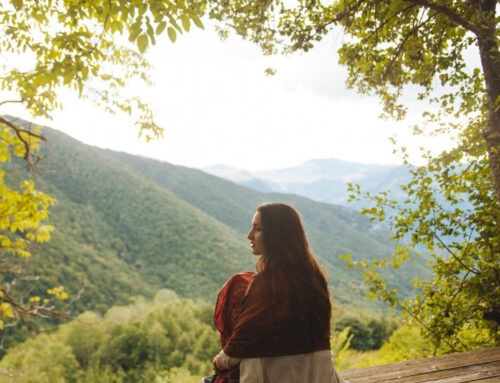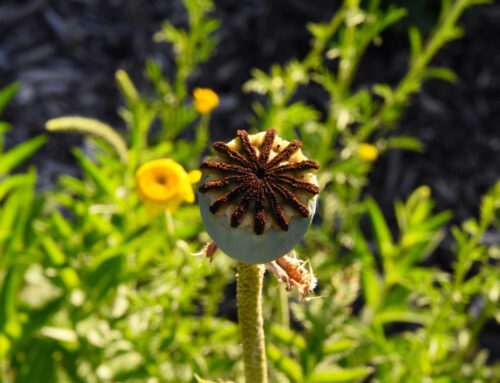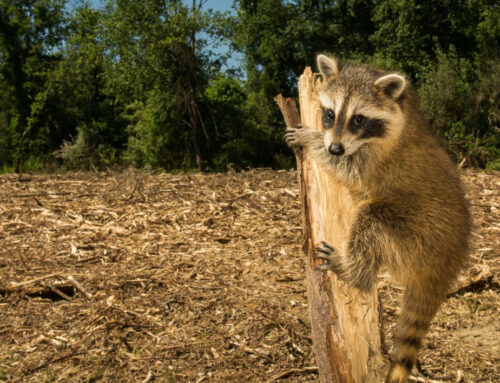Here in Northern Kentucky, I recently woke to a winter wonderland. The garden was already blanketed with several inches of the white stuff, tree branches were gently bowing and swaying, and each fluffy, falling snowflake was nearly the size of a quarter. The scene was stunningly beautiful.
I’ve always loved snowfalls. While snow may not be fun to drive in, it nevertheless offers numerous benefits to our gardens.
- Snow is an excellent insulator. Think of snow as another of nature’s mulches and natural protectors. In many ways like fallen leaves, snow moderates temperature changes and protects plants from bitter winds, freeze-thaw cycles, and ice buildup which can harm, break, or even kill young or sensitive plants and trees. Should you experience an extremely heavy snowfall, gently brush the snow off accessible branches as soon as possible to prevent breakage. However, do not try to remove ice. This will probably cause more damage to the bark of the plant/tree than if the ice is allowed to melt naturally.
- Snow helps propagate seeds. Many of our beautiful plants such as peonies, blazing stars, echinacea, hyssop, and milkweed, need a period of cold temperature to prevent early germination and break their dormancy cycles. This is called Gardeners often simulate stratification by placing seeds in a refrigerator bin for several weeks. However, nature does this naturally by providing colder seasonal temperatures. Snow also assists this process by helping seeds make better contact with the soil.
- Snow is a natural source of water and nitrogen. Snow preserves and restores water to plants and the soil and helps replenish the land after a period(s) of drought. Furthermore, as snow falls through earth’s atmosphere, it collects nitrogen and other particulates like sulfur which serve as natural fertilizers for our gardens.
- Snow offers protection for many animals. Not only does snow offer camouflage protection for animals such as the arctic fox, snowshoe hare, snowy owl, and of course, our polar bears, it also allows animals such as small rodents to venture out more safely from their burrows to search for food beneath the mantles of snow and away from the eyes of predators. Snow cover also benefits the many mammals, reptiles, insects, and amphibians which hibernate beneath the ground.
- Snowfalls offer further glimpses into the miracles of nature. This last snowfall reminded me to slow down and take in the wonders of our natural world. I poured myself a warm cup of tea, bundled up in a blanket, and sat on the covered deck of our back porch. Then, I watched and listened. The gentle taps of gigantic, billowy snowflakes falling on the trees and the objects around me were nothing less than a sonnet or a lullaby. I watched the geese and ducks swimming effortlessly together in our pond but carefully eyeing two muskrats which had emerged from their burrows. Thanks to the blanket of snow on the ground, I could finally see the deer trails of the herd which visits our backyard most mornings in the early hours before dawn. But as I looked closer, I could also see the tracks of several raccoons, a possum, and even a fox. Then of course, there were the birds (and the squirrels ) who seemed to be over the moon with joy over the snowfall. Purple finches, blue jays, cardinals, wrens, juncos, woodpeckers, sparrows, and starlings – just to name a few – congregated at the feeders, and were excitedly talking, playing, and eating with each other, while others were simply content to sit in the trees singing birdsongs worthy of any church choir.
It truly was a blessed morning.
The next time you witness a fresh snowfall, please take the time to appreciate another of nature’s miracles. Even if it’s just for a few minutes, slow down, watch, and listen to the natural world around you. It will do wonders for your body and soul.
Nature nurtures us all.








